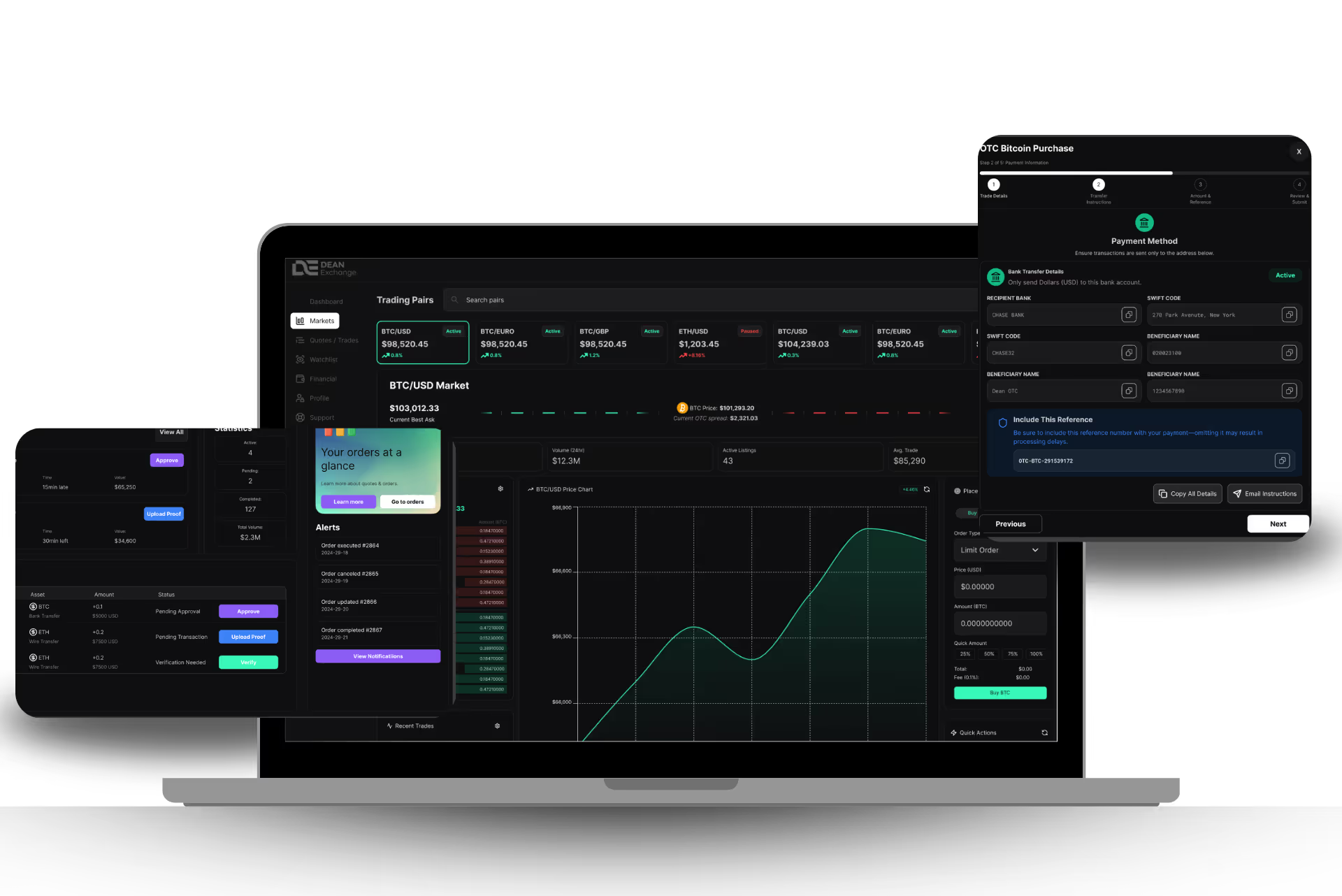By the
This is some text inside of a div block.
This is some text inside of a div block.
•
5
min read

As cryptocurrency adoption continues to rise globally, so does the attention it receives from regulators. The growing concern over financial crime, fraud, and anonymity in digital transactions has brought AML (Anti-Money Laundering) and KYC (Know Your Customer) regulations to the forefront of the industry. These compliance standards are not just checkboxes—they're critical pillars of legitimacy and trust for any cryptocurrency exchange or blockchain-based platform.
In this article, we explain what AML and KYC are, how they apply to the crypto space, regional differences in enforcement, and the challenges of balancing privacy with compliance. Whether you're a trader, developer, or investor, understanding these standards is essential for participating responsibly in the evolving world of digital finance. At Dean Exchange, we offer ongoing education, cryptocurrency tutorials, and live blockchain sessions to help you navigate compliance with clarity and confidence.
KYC (Know Your Customer) is the process of verifying the identity of users before they are allowed to use a financial platform. This typically includes collecting government-issued IDs, proof of address, and biometric verification in some cases.
AML (Anti-Money Laundering) refers to a set of laws and procedures designed to prevent the use of financial systems for money laundering, terrorism financing, and other illicit activities. AML frameworks require ongoing monitoring of user activity, transaction patterns, and reporting of suspicious behavior.
Together, KYC compliance cryptocurrency measures and AML protocols serve to:
Centralized cryptocurrency exchanges (CEXs) such as Coinbase, Binance, and Kraken are generally required to implement strict AML and KYC protocols. These include:
Most exchanges now use third-party KYC providers and AI-driven tools to streamline the verification process and ensure compliance.
Decentralized exchanges (DEXs) like Uniswap, PancakeSwap, or Curve operate without centralized intermediaries, which raises unique challenges for AML compliance.
While DEXs don’t typically require user accounts or KYC documentation, they are under increasing scrutiny from regulators. Some projects are beginning to explore KYC layers or permissioned pools to bridge the gap between decentralization and regulatory compliance.
Dean Exchange Insight: During our live blockchain sessions, we examine how regulatory trends are reshaping decentralized platforms and what developers can do to stay ahead.
Implementing AML in crypto is crucial for fostering legitimacy. Without proper safeguards, bad actors can exploit blockchain anonymity to launder money, finance terrorism, or conduct scams.
Examples of past issues:
These cases show how failure to comply can damage reputation, trigger enforcement actions, and disrupt entire ecosystems.
Many institutional investors, banks, and governments are hesitant to enter the crypto market without strong compliance safeguards. AML/KYC programs build the foundation for:
The growing alignment between crypto and blockchain technology in traditional finance hinges on robust identity and anti-fraud frameworks.
The U.S. enforces AML laws through the Bank Secrecy Act (BSA) and requires exchanges to register with FinCEN. The SEC and CFTC also weigh in on whether certain tokens are securities or commodities, influencing KYC obligations.
Key Points:
Under the Fifth and Sixth Anti-Money Laundering Directives, EU exchanges must:
MiCA also covers stablecoins, crypto custodians, and wallet providers—creating a harmonized compliance framework across member states.
Dean Exchange Tip: For global users, understanding regional nuances is key. Our cryptocurrency tutorials break down regulatory obligations by geography, helping you stay compliant across borders.
One of the founding ideals of cryptocurrency is privacy and self-sovereignty. But as AML and KYC measures expand, there’s growing concern about how to protect user privacy.
Challenges:
To balance these concerns, new solutions are being explored:
These innovations may soon allow for AML in crypto without sacrificing user control—a topic regularly explored in Dean Exchange’s educational tracks and expert panels.
At Dean Exchange, we recognize that compliance is not an obstacle—it's a key to building a stronger, safer, and more inclusive crypto economy. We offer:
Our cryptocurrency tutorials explain AML and KYC processes in simple, actionable language—ideal for beginners and professionals alike.
Engage with experts during our live blockchain sessions, where we cover evolving regulations, compliance tools, and legal best practices.
Access country-specific guidance and alerts about new laws and enforcement trends so you can adjust strategies proactively.
We showcase emerging tools, including KYC-on-chain solutions and AML software integrations for exchanges, dApps, and wallets.
As the crypto industry matures, KYC compliance cryptocurrency practices and AML in crypto are no longer optional—they're essential. Regulatory frameworks are expanding across all major regions, and businesses that adopt a proactive approach will benefit from greater user trust, legal certainty, and market access.
However, the path forward requires balance: embracing oversight without undermining the core values of blockchain technology—transparency, privacy, and decentralization.
Dean Exchange is here to guide that journey. With expert resources, interactive learning, and up-to-date insights, we empower individuals and organizations to engage in crypto securely, responsibly, and with confidence.


Join our newsletter for exclusive insights, breaking crypto trends, and learning opportunities—delivered straight to your inbox.